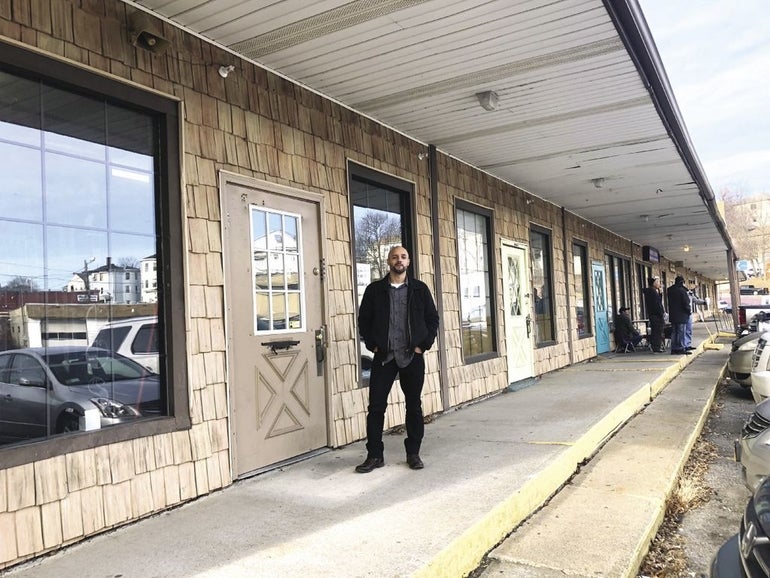Left behind: Minorities are hard to find in the legal pot industry
 Photo | Zachary Comeau
Ross Bradshaw hopes to turn this vacant space in a Main South strip mall into the New Dia marijuana retailer.
Photo | Zachary Comeau
Ross Bradshaw hopes to turn this vacant space in a Main South strip mall into the New Dia marijuana retailer.
Marijuana is now legal to sell in Massachusetts, and the state's newest industry has taken off.
Five stores have been given the state's greenlight to sell products, and more than $2.2 million of cannabis products were sold in the first month of sales in an industry anticipated in bring in $1 billion by its second fiscal year.
Worcester native Ross Bradshaw and his prospective marijuana retail business New DIA want to tap into that money-making machine, with an application to Worcester officials in the hopes of landing one of the last six host community agreements.
But people in the marijuana industry like Bradshaw – a minority who grew up in the Washington Heights neighborhood of Worcester – are hard to find. The industry, which in its infancy relies on companies with ready accesfs to cash, is not very diverse.
According to the Massachusetts Cannabis Control Commission, 3.1 percent of the 224 businesses in the state's regulatory system are owned by minorities, 2.2 percent are owned by women and a 1.8 percent are owned by LGBT people.
Meanwhile, 85.3 percent are owned by someone not identifying as a disadvantaged business enterprise, meaning they most likely are run by white males.
Minority workers in the marijuana industry – whether they be executives, board members, managers, employees or volunteers – are also hard to find in the industry. According to the CCC, 73 percent of the state's marijuana workers are white, as of Dec. 13. The next largest group in the industry is Latinos at 6.4 percent. African Americans make up 4.2 percent of workers.
Before marijuana was legal to sell and possess in Massachusetts, minorities played a disproportionately large role in the cannabis industry, based on arrest records. But now with the industry legalized, nearly all the businesses are run by rich white men, and their workforces skew disproportionately white.
To combat this trend, state marijuana officials have crafted a new program meant to include more minorities and people impacted by the War on Drugs in the legal industry. Cities like Boston and Somerville have at least discussed setting benchmarks to give a certain portion of licenses to a diverse groups of applicants. However, Worcester – with its large minority population – has not set such benchmarks.
Excluded from the industry
Bradshaw said countless of his friends and family members have been arrested or incarcerated for drug crimes. Some had been promising athletes with their dreams of a scholarship taken away when they were arrested.
“I saw early on the disproportionate arrest rates and law enforcement when it came to white and black,” Bradshaw said.
As the state's medical marijuana industry got the greenlight from voters in 2012 and recreational four years later, Bradshaw saw people of color being excluded from that industry.
Of the two medical marijuana dispensaries licensed to operate in Worcester, neither is owned by a minority.
“I didn't want to see that trend in recreational,” Bradshaw said.
Despite entrepreneurs like Bradshaw, the lack of minorities in the industry appears to be holding true for recreational shops in Worcester as well.
Nine retail recreational marijuana stores have either entered into negotiations with the city or have already received some city and state approvals.
Of those nine, just one – Community Growers Partnership – is an economic empowerment applicant, which are those who have been disproportionately impacted by marijuana enforcement. City spokeswoman Mike Vigneaux said Worcester is considering entering into negotiations with the other four economic empowerment applicants, including New DIA, for the remaining six retail licenses in Worcester.
Beth Waterfall, executive director at marijuana industry advocate Elevate Northeast, said cannabis businesses need a boatload of cash and access to capital in their early phases. A location must be secured before applications can be sent to local boards and the Cannabis Control Commission, so companies could be paying rent for a space not open for sales for more than a year.
Elevate Northeast works with young cannabis firms to introduce them to investors and provide technical training to help the state's newest industry flourish.
Elevate Northeast works with young cannabis firms to introduce them to investors and provide technical training to help the state's newest industry flourish.
The cannabis industry, she said, isn't much different than other industries other than its newness and federal illegality. For people of color and women, raising money to start a business has always been a challenge.
“They don't have that social capital, nevermind that financial capital,” she said.
War on Drugs casualties
Disadvantaged groups looking to get their foot in the door of the newly legal marijuana industry have been, in some way, impacted by the War on Drugs.
According to a 2016 report from the ACLU, the arrest rate for marijuana possession in 2014 was 3.3 times higher for black people than it was for white people. For sales, it was 7.1 times higher.
African Americans made up 41 percent of sales arrests and 24 percent of possession arrests in Massachusetts in 2014, despite making up 8 percent of the state's overall population.
The CCC is rolling out programming aimed at making the industry fair, equitable and accessible, including a social equity program, implemented in December, meant to give those affected by marijuana enforcement a chance to partake legally.
Applicants will receive professional training, technical services and mentoring for those facing system barriers, including access to capital.
Those eligible include people who have have lived in an area of disproportionate impact for at least five of the last 10 years and have an income not exceeding 400 percent of the federal poverty level; were convicted of a drug crime and lived in the state for at least a year; or are married to or a child of someone with a past drug conviction.
The CCC identified 29 such communities of disproportionate impact, including Worcester, Fitchburg, Spencer and Southbridge in Central Massachusetts.
Commissioner Shaleen Title has been front and center in the CCC's efforts to increase access to the industry, saying the ownership and workforce of the cannabis industry should reflect the demographic breakdown of the Massachusetts population.
Communities disproportionately harmed by prohibition, however, should disproportionately benefit from legalization, Title said.
No Worcester benchmarks
Although not yet outlined by the CCC, Title said she wants to develop additional types of marijuana business licenses with lower capital requirements tailored for groups who are excluded from other types of business models.
“The commission's decisions to move forward with a pilot program for social consumption created collaboratively with municipalities, as well as allowing only microbusinesses to offer home delivery, are specific examples we are currently exploring,” she said.
Bradshaw lauded Title and the CCC for taking on that challenge, but levied criticism at Worcester – New England's second largest city – for being quick to award licenses to large operators and not taking steps to encourage diversity in the city's cannabis industry when 42 percent of its residents are minorities.
Worcester officials have included diversity on a list of criterion when considering which companies with which to negotiate a host community agreement, but no benchmark is set.
So far, Worcester is home to a handful of large companies backed by large investment firms, including Mayflower Medicinals and The Botanist, the latter of which has former U.S. Speaker of the House John Boehner and former Massachusetts Governor Bill Weld on its board of directors.
“It's very disheartening,” Bradshaw said. “That's why I think cities like Boston are really stepping up to the plate and setting a quota. They aren't just saying they care about diversity, equality and equity. They're holding themselves accountable to it.”









0 Comments